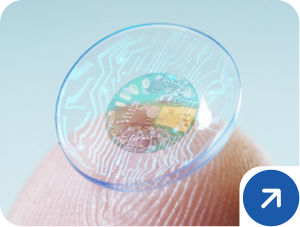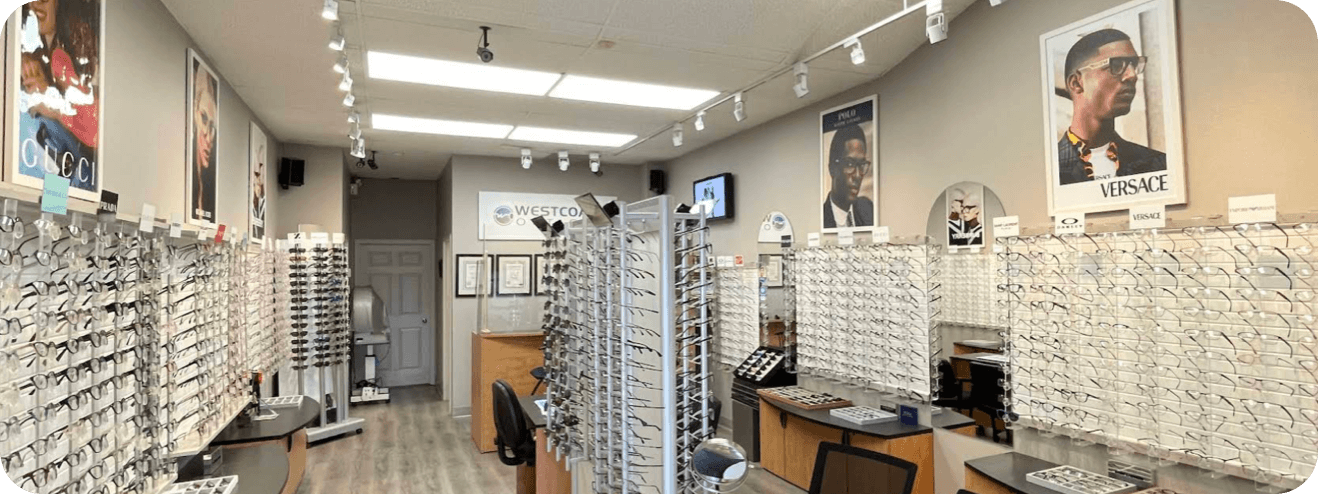Getting your eyes dilated is a normal part of a thorough eye exam, but it isn’t always necessary. If it’s been a while since your last dilated eye exam, or you’ve never had one before, you may have some questions.
How do you know if you need to get your eyes dilated? What happens during an eye exam? What does it feel like to get your eyes dilated? If any of these questions sound familiar, you’re in the right place.
In this blog article, we’ll go over everything you need to know about dilated eye exams. Still have questions? Our team at West Coast Optical is always here to help. Contact us today!
Why a Dilated Eye Exam is Important
Normally, your pupils get smaller when light shines into them, making it difficult for your optometrist to see certain structures in the back of your eye. In a dilated eye exam, your optometrist will apply dilating eye drops in your eyes which forces the pupils to stay open, This allows them to see much more of the back of your eye, including the entire retina, a part of the retina called the macula, and the optic nerve.
During a dilated exam, your doctor can detect signs of eye disease that may not be visible without dilation. Some of the eye diseases your optometrist will check for during a dilated eye exam don’t present any symptoms until they advance to a severe level, making it especially important to spot issues early. To protect your sight and preserve your vision, it’s important to get dilated eye exams when recommended by your doctor.
Do I Need to Have My Eyes Dilated?
There are a number of factors that can impact your optometrist’s decision to dilate your eyes during an eye exam.
Your Age
As you age, the risk of developing an eye disease increases. If you’re 60 years or older, it’s recommended that you receive a dilated eye exam every 1 to 2 years.
Your Ethnic Background
People of certain ethnic backgrounds are at increased risk of some eye diseases. If you’re black, hispanic, or asian, it’s recommended that you have a dilated eye exam every one to two years, after age 40.
Your Eye Health & Overall Health
Having a history of diseases that affect your eyes, like diabetes, can increase your risk of developing eye diseases. In addition to this, if you visit your optometrist with complaints of vision symptoms, they may recommend a dilated eye exam to ensure you get a thorough and comprehensive exam.

What Conditions are Diagnosed with a Dilated Eye Exam?
In a dilated eye exam, your optometrist has a better opportunity to notice small changes in your eye health, and detect various eye conditions before they have a chance to progress.
Without dilation, early signs of eye disease may go unnoticed, leaving you with less time to get the treatment you need.
Glaucoma
Glaucoma is a group of eye diseases that affects the optic nerve. While the optic nerve can be seen through an undilated pupil, your optometrist won’t be able to the same in-depth look that they can with dilation.
Diabetic Retinopathy
Diabetic retinopathy is a common retinal disease resulting from complications of diabetes. In order to view the complete retina to assess signs of diabetic retinopathy, you’ll need a dilated eye exam.
Macular Degeneration
Age-related macular degeneration (AMD) is another retinal disease that is diagnosed and monitored by examining the retina through a dilated eye exam.
What Happens When You Get Your Eyes Dilated?
If you’re getting your pupils dilated during an eye exam, your optometrist will put dilating drops in your eyes. Then, it takes about 20–30 minutes for your pupils to fully dilate and they’ll be able to begin examining the back of your eye.
After your eyes are fully dilated, the effects will last about four to six hours for most people. If you get your eyes dilated you may experience temporary side effects, including:
- Light sensitivity
- Blurry vision
- Trouble focusing on nearby objects
- Slight stinging right after the drops are put in
What Do I Prepare for My Dilated Eye Exam?
Because of the temporary side effects associated with dilated eye exams, it’s important to take the necessary precautions to protect you and your eyes after your exam. We suggest:
- Arrange for a ride home after your appointment so you don’t have to drive with blurred vision
- Bring sunglasses to your appointment in case you experience sensitivity to light
- Take a few hours off work if possible to not over-extend your vision or strain your eyes
Book Your Next Eye Exam
Is it time for your next eye exam? Book an appointment at West Coast Optical today!















